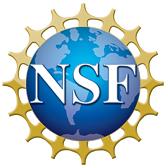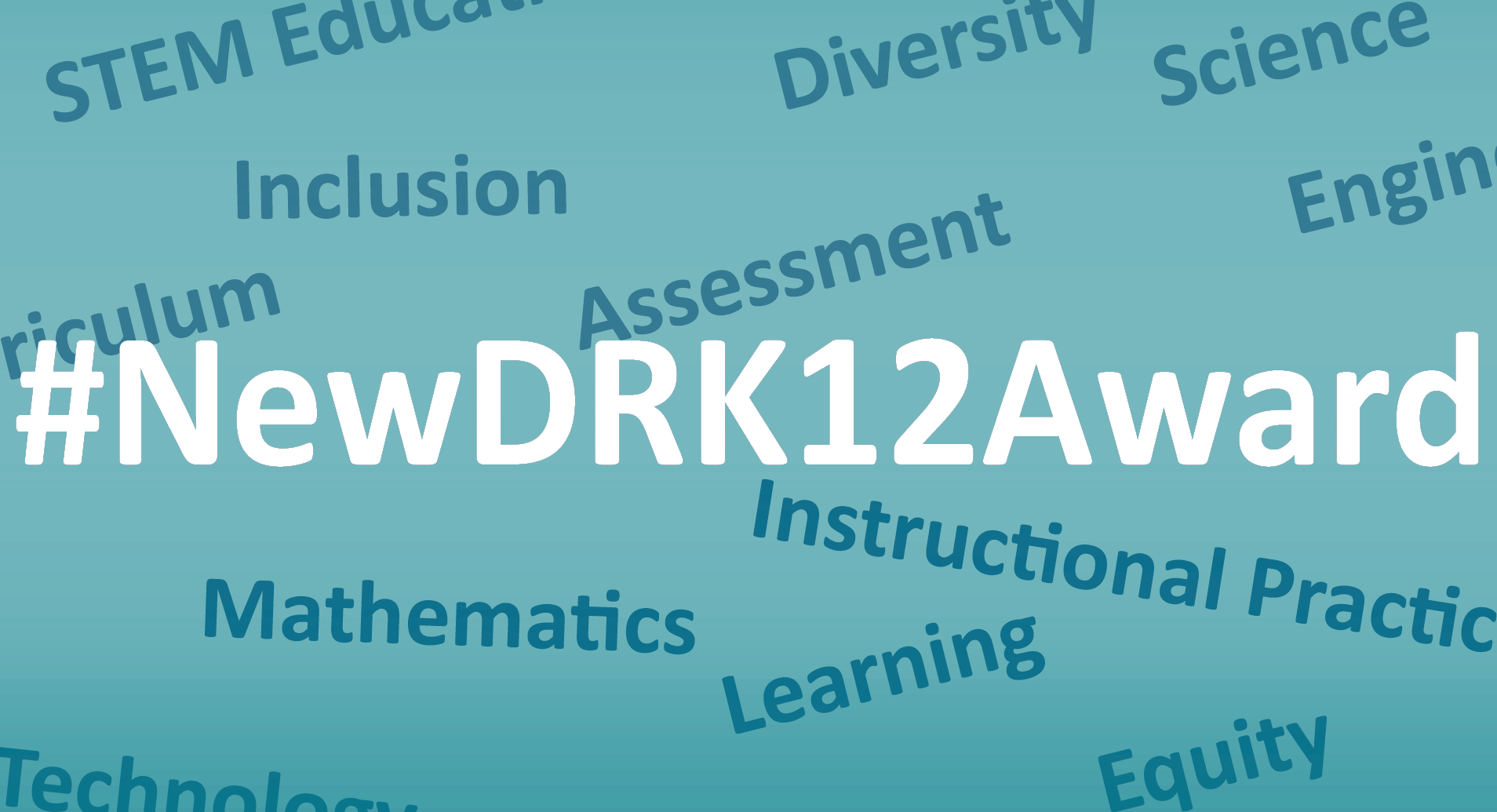Dear Colleagues,
Last week, NSF announced significant changes to preK–12 funding with the launch of the NSF STEM K–12 program and solicitation. DRK–12 will no longer accept proposals. (Read our full article below.)
New DRK–12 awards have been announced since our July newsletter. Congratulations to these newest project teams! We eagerly await to hear about additional awards.
As DRK–12 and CADRE come to an end, we plan to celebrate and share the history and accomplishments of the program. We welcome your stories about the significance of the DRK-12 program to your research and the evolution of preK-12 STEM education. Please send your contributions of any length to cadre@edc.org or enter them here.
The DRK-12 program has funded important research to improve teaching and learning for children. This month’s Spotlight on Early STEM Learning features DRK-12 projects that depict early learning as an entry point for lifelong STEM education and engagement. They position play, culture, family, and teachers as central levers in children’s STEM education and development, and challenge narrow definitions of readiness and skill. We also invite you to revisit and share three of CADRE’s related, “oldie but goodie” resources: our video on The Importance of Early Math Education, featuring DRK-12-funded researchers Arthur Barody, Jere Confrey, Paul Goldenberg, and Julie Sarama, and our briefs, Considerations for STEM Education from PreK Through Grade 3 and Nurturing STEM Skills in Young Learners, PreK–3, which highlight important considerations about STEM educational experiences for young children, how to best support professional learning for the educators who provide those experiences, and the need for intentional, play-based STEM learning in preK–3, supported by clear goals and strong teacher capacity.
In case you missed it, CADRE provided a summer reading list that captures recent DRK–12 publications. We’ve even added some new publications to the list. NSF will be affected by the recent executive order, Improving Oversight of Federal Grantmaking, which notably states that grants must be approved by a political appointee. Finally, a recording of the recent National Science Board is now available.
Best,
The CADRE Team
NSF Restructures DRL | Announcement
 Last week, NSF announced significant changes to DRL funding programs with the launch of the NSF STEM K–12 program and solicitation. With this new funding opportunity comes the archival of longstanding DRL programs including DRK–12, AISL, CSforAll, as well as others. There have also been changes to ECR:Core, which will now only accept DUE and DGE focused applications. The solicitation encourages applicants who planned to apply to the archived or modified programs to submit proposals to NSF STEM K–12 instead. Full proposals to this solicitation are accepted at any time. Most awards (~40) supported by the program will range between $25,000 and $750,000, with a typical duration of one to three years. The program is expected to be capped at ~30 million dollars.
Last week, NSF announced significant changes to DRL funding programs with the launch of the NSF STEM K–12 program and solicitation. With this new funding opportunity comes the archival of longstanding DRL programs including DRK–12, AISL, CSforAll, as well as others. There have also been changes to ECR:Core, which will now only accept DUE and DGE focused applications. The solicitation encourages applicants who planned to apply to the archived or modified programs to submit proposals to NSF STEM K–12 instead. Full proposals to this solicitation are accepted at any time. Most awards (~40) supported by the program will range between $25,000 and $750,000, with a typical duration of one to three years. The program is expected to be capped at ~30 million dollars.
Join NSF for a general overview webinar about FY26 funding opportunities in DRL on September 4, 2025 at 1-2:30pm ET. Registration is required. Regularly check the NSF STEM K-12 webpage and CADRE social media for information about additional webinars and office hours to be announced. Email STEMK12@nsf.gov with questions.
NSF also announced two other new funding opportunities—Dear Colleague Letters—aligned with the recent executive order to advance K–12 artificial intelligence education.
- The Expanding AI Career and Skilled Technical Workforce Opportunities in Support of High School Students DCL seeks to strengthen the U.S. AI workforce and advance education and innovation pipelines by increasing early access to high-quality, AI learning opportunities for America's high school students.
- The Expanding K–12 Resources for AI Education DCL seeks to build upon NSF's extensive investments in fundamental research, technology transition and education related to the science and application of AI. Existing awardees with K–12 AI or computer science education experience are and invited to submit supplemental funding proposals to refine, scale, and/or implement established K–12 AI-related activities.
As DRK–12 and CADRE come to an end, we plan to celebrate and share the history and accomplishments of the program in our remaining months as the DRK–12 resource center. We invite you to share your reflections on the significance of the DRK-12 program for your research and for the evolution of preK–12 STEM education. Stories of any length are welcome. CADRE plans to post these contributions on cadrek12.org; please let us know if you would prefer your comments to remain anonymous. CADRE reserves the right to curate submissions before posting. Send your contributions to cadre@edc.org or submit them here.
Early STEM Learning | Spotlight

This month’s Spotlight highlights the work of 14 DRK–12 projects that focus on early learning in science, mathematics, and computer science. For more information about early STEM learning, browse our list of reports, DRK–12 publications, and other related resources.
In this Spotlight:
- Featured Projects
- Bilingualtek: An Integrated Science-Language Approach for Latinx Preschoolers (PI: Lucía Méndez)
- Building a Flexible and Comprehensive Approach to Supporting Student Development of Whole Number Understanding (PI: Benjamin Clarke)
- CAREER: Investigating Young Children's Opportunities to Learn Mathematics in Early Childhood Classrooms (PI: Nicholas Johnson)
- CAREER: Sparking "Number Talks" to Strengthen Mathematical Identities (PI: Dawn Woods)
- Developing and Validating Assessments to Measure and Build Elementary Teachers' Content Knowledge for Teaching about Matter and Its Interactions within Teacher Education Settings (Collaborative Research) (PIs: Deborah Hanuscin, Jamie Mikeska)
- Examining Potential Causal Connections and Mechanisms Between Children's Block Play and Mathematics Learning (PI: Sara Schmitt)
- Exploring Early Childhood Teachers’ Abilities to Identify Computational Thinking Precursors to Strengthen Computer Science in Classrooms (PI: Sean Justice)
- Investigating Early Elementary Students' Computational Thinking Development in Integrated Mathematics-Coding Instruction (PI: Jessica Shumway)
- Math Partners: Collaborations to Support Early Math Learning (PI: Stephanie Smith)
- Number and Spatial Skill Development from 2 Years to 2nd Grade: Examining Associations with Home Math Environments in Early and Middle Childhood (PI: Heather Bachman)
- Professional Learning Hub for Early Science (HubES): Leveraging Technology to Develop Supports for Educators to Promote Meaningful Science Learning in Preschool (PI: Ximena Dominguez)
- The Impact of an Inclusive Grades K–2 Early Algebra Intervention Implemented by Classroom Teachers (PI: Maria Blanton)
- The Smart Playground: Computational Thinking Through Robotics in Early Childhood (Collaborative Research) (PIs: Marina Bers, Andres Bustamante, Chris Rogers)
- Young Mathematicians: Expanding an Innovative and Promising Model Across Learning Environments to Promote Preschoolers' Mathematics Knowledge (PI: Jessica Young)
- Related Resources
New DRK–12 Awards | Project List

Since our July newsletter, additional DRK-12 projects have been funded. View the full list of recent awards below.
Congratulations to the newest DRK-12 awardees!
Newsbites
News from NSF
- NSF held information sessions for the new NSF Translation to Practice program. See webinar recordings.
- NSF recently updated guidance on NSF Priorities.
News from DRK-12 Projects and Awardees
Awards & Recognition
- Ellen J. Yezierski received the 2026 ACS Award for Achievement in Research for the Teaching and Learning of Chemistry.
Publications
- A Multimodal Interactive Framework for Science Assessment in the Era of Generative Artificial Intelligence | Journal of Research in Science Teaching
Authors: Yizhu Gao, Xiaoming Zhai, Min Li, Gyeonggeon Lee, and Xiaoxiao Liu - Artificial Intelligence in Science Education Research: Current States and Challenges | Journal of Science Education and Technology
Authors: Gyeonggeon Lee, Minji Yun, Xiaoming Zhai, and Kent Crippen - Beyond Technical Fixes: Reconsidering Equity Sticks and Expanding Notions of Equitable Teaching | Urban Education
Authors: Simona Goldin, Darrius D. Robinson (2020–21 CADRE Fellow), Meghan Shaughnessy, Nicole M. Garcia, Merrie Blunk, D’Anna Pynes, and Jillian P. Mortimer - Citizen Science in the Elementary Classroom: Going Beyond Data Collection | Science and Children
Authors: Jill K. McGowan, Lindsey Sachs, Anna Bruce, Danielle R. Scharen, Meredith Hayes, and P. Sean Smith - Culturally and Linguistically Sustaining Formative Assessment in Science and Engineering: Highlighting Multilingual Girls’ Linguistic, Epistemic, and Spatial Brilliances | Journal of the Learning Sciences
Authors: Shakhnoza Kayumova, Akira Harper, Tia Madkins, and Esma Nur Kahveci - Fostering Mathematics Engagement Through Citizen Science | Mathematics Teacher: Learning and Teaching PK–12
Authors: Danielle R. Scharen, Erin McInerney, Lindsey H. Sachs, Meredith L. Hayes, and P. Sean Smith - “It Would Be Cool to Make Up My Own Activities”: Youth Voice in STEM Teaching and Learning | Connected Science Learning
Authors: Victoria Oliveira, Virginia Andrews, Patricia J. Allen, and Gil G. Noam - Mathematics Teachers’ Interpretations of Students’ Perceptions of the Classroom Learning Environment: Opportunities for Inquiry | Journal of Mathematics Teacher Education
Authors: Kara Jackson, Hannah J. Nieman, Daniela DiGiacomo, Fabio Campos, and Nicholas Kochmanski - Re-examining the Relationship Between Three-Dimensional Science and Engineering Knowledge and Student Interest: A Mixed Methods Study | Disciplinary and Interdisciplinary Science Education Research
Authors: Julia E. Calabrese, Nancy Butler Songer, Daniel Kalani Aina Jr., and Holly Cordner - The Interplay Between Teacher Professional Development and Noticing: An Analysis of How Noticing Changes and What Teachers Attribute to Changes or Consistencies | ZDM – Mathematics Education
Authors: Julie M. Amador and Ryan Gillespie - The Role of Discrimination and Barriers in the Perceptions of Adolescents With and Without Disabilities of STEM Classes and Jobs | International Journal of Science and Mathematics Education
Authors: Kelly Lynn Mulvey, Jacqueline Cerda-Smith, Angelina Joy, Martha Batul, and Emine Ozturk - Unveiling Scoring Processes: Dissecting the Differences Between LLMs and Human Graders in Automatic Scoring | Technology, Knowledge and Learning
Authors: Xuansheng Wu, Padmaja Pravin Saraf, Gyeonggeon Lee, Ehsan Latif, Ninghao Liu, and Xiaoming Zhai - Ways Researchers Can Use Teacher Noticing to Inform the Conceptualization of a Complex Teaching Practice | ZDM – Mathematics Education
Authors: Shari L. Stockero, Keith R. Leatham, and Blake E. Peterson
Do you have news to share? Email cadre@edc.org.
Upcoming Opportunities
The following funding and publication opportunities, listed by deadline, may be of interest to you and your DRK-12 project members.
Funding

- NEW! Ongoing – NSF | NSF STEM K-12 (STEM K-12)
- September 15, 2025 – William T. Grant Foundation | Institutional Challenge Grant
- NEW! September 16, 2025 – NSF | National Science Foundation Translation to Practice (NSF TTP)
- October 2, 2025 – NSF | Advanced Technological Education (ATE)
- October 2, 2025 – NSF | EDU Core Research (ECR:Core)
- October 6, 2025 – AERA, NSF | AERA-NSF Dissertation and Research Grants
- October 21, 2025 – NSF | Historically Black Colleges and Universities - Excellence in Research (HBCU - EiR) (Full Proposal)
- November 4, 2025 – NSF | Research on Innovative Technologies for Enhanced Learning (RITEL)
- NEW! January 20, 2026 – NSF | National Science Foundation Translation to Practice (NSF TTP)
- February 27, 2026 – NSF | EHR Core Research: Building Capacity in STEM Education Research
- NEW! May 19, 2026 – NSF | National Science Foundation Translation to Practice (NSF TTP)
- NEW! June 1, 2026 – NSF | NSF EPSCoR Graduate Fellowship Program (EGFP)
- NEW! July 22, 2026 – NSF | Faculty Early Career Development Program (CAREER)
Publications
 August 31, 2025 – Educational Technology & Society | Robotics-Facilitated Teaching and Learning: An Embodied Cognition and Multi-modal Perspective
August 31, 2025 – Educational Technology & Society | Robotics-Facilitated Teaching and Learning: An Embodied Cognition and Multi-modal Perspective- August 31, 2025 – Journal for Research in Mathematics Education | Strengths-based Research at the Intersection of Mathematics and Disability (Extended Abstract Deadline)
- September 2025 – Connected Science Learning | Data, Data Everywhere!
- September 1, 2025 – Frontiers in Education | Advancing Pedagogy Through Innovation (Manuscript Summary Deadline)
- September 1, 2025 – Machine Learning | Towards Trustworthy Foundation Models: Interpretability, Safety, and Robustness
- NEW! September 8, 2025 – Frontiers in Education | Beyond Proposals: Scientific Evidence and Policy Replication of Effective Strategies in Reducing Educational Inequality (Manuscript Summary Deadline)
- September 14, 2025 – Frontiers in Education | Unleashing Potential in Changing Times: Professional Networks and Learning Communities in Professional Development (Manuscript Summary Deadline)
- September 15, 2025 – Review of Research in Education | Systematic Review Methods for Synthesizing Evidence from Diverse Approaches to Research to Inform Change Efforts in Complex Educational Systems (Proposal Deadline)
- September 20, 2025 – Journal of Engineering Education | Surrounding Systems’ Influences on Engineering Education: Focus on Organizations, Policies, and Contexts
- September 25, 2025 – Frontiers in Education | Reimagining Education to Improve Metacognitive and Socioemotional Skills for the 21st Century (Manuscript Summary Deadline)
- September 30, 2025 – Frontiers in Education | Learning and Identity in Rural Communities Amid Sustainable Energy Transitions: Global Perspectives on Education and Place-Based Identity (Manuscript Summary Deadline)
- September 30, 2025 – ZDM – Mathematics Education | Gender, Psychology, and Mathematics Education
- October 1, 2025 – Journal of Chemical Education | Teaching Innovation in Materials Science and Engineering Design
- October 1, 2025 – Science & Children | Teaching Resources to Engage and Inspire
- October 1, 2025 – Science Scope | Earth Science Experiences
- October 1, 2025 – The Science Teacher | Rigorous Science Learning for Students with Disabilities
- NEW! October 20, 2025 – Frontiers in Education | Reconnecting Knowledge and Practice in Teaching and Teacher Education Through Multimodal Reflection (Manuscript Summary Deadline)
- October 31, 2025 – Educational Studies in Mathematics | Mathematics Education for Sustainable Futures
- NEW! October 31, 2025 – Mathematics Teacher: Learning and Teaching PK-12 | All Tasks Issue
- November 2, 2025 – Frontiers in Education | Artificial Intelligence in Educational Technology: Innovations, Impacts, and Future Directions (Manuscript Summary Deadline)
- NEW! November 2, 2025 – Frontiers in Education | Beyond Constructionism: Learning, Agency, and Design in the Age of Artificial Intelligence (Manuscript Summary Deadline)
- NEW! November 2, 2025 – Frontiers in Education | Human Factors and Design in Immersive and Generative Media Technologies (Manuscript Summary Deadline)
- NEW! November 15, 2025 – Journal of Research on Technology in Education | Promoting PK-12 Teachers’ AI Competencies: Practices and Challenges (Abstract Deadline)
- December 1, 2025 – Science & Children | What Is Science?
- December 1, 2025 – The Science Teacher | Science in Rural Spaces
- December 31, 2025 – International Journal of Science and Mathematics Education | Mathematics for and in STEM Education
- December 31, 2025 – Research in Science Education | Artificial Intelligence in Science Education
- December 31, 2025 – Research in Science Education | STEM and Teaching Engineering Design
- February 1, 2026 – Science & Children | Celebrating Collaborations
- February 1, 2026 – The Science Teacher | Utilizing Discourse in the Science Classroom
- April 1, 2026 – The Science Teacher | Reaching Our Multilingual Learners
- June 1, 2026 – The Science Teacher | Social Justice and Advocacy in the Science Classroom
- NEW! June 30, 2026 – Research in Science Education | Research-Informed Policy and Practice in Science Education
- December 31, 2026 – Research in Science Education | Argumentation and the Problem of Misinformation in Science Education
- December 31, 2026 – Research in Science Education | Multimodal Literacies and Representations for Learning
 August 29, 2025 – 2026 ITEEA Annual Conference (Application to Present)
August 29, 2025 – 2026 ITEEA Annual Conference (Application to Present)- September 2, 2025 – 2026 RCML Annual Conference (Call for Proposals)
- September 12, 2025 – 2026 NCME Annual Meeting (Call for Proposals)
- NEW! September 15, 2025 – 2026 ASEE Southeastern Conference (Call for Abstracts)
- September 26, 2025 – 2026 Spring CUE Conference (Call for Abstracts)
- NEW! September 29, 2025 – 2026 ACS Spring Meeting (Call for Abstracts)
- October 5, 2025 – 2026 ISLS Annual Meeting (Call for Papers)
- November 10, 2025 – 2026 Biennial Conference on Chemical Education (Request for Programs)
- November 17, 2025 – 2026 SITE Conference (Call for Papers)
- January 5, 2026 – 2026 CSEDU International Conference (Call for Papers)
- January 20, 2026 – 2026 CSEDU International Conference (Call for Sessions)
Career & Professional Development

- NEW! October 1, 2025 – Stanford University, Graduate School of Education: Faculty Position in Education Data Science
- NEW! November 30, 2025 – Computer Applications in Engineering Education: Associate Editor
- Until filled – Brown University, Annenberg Institute: Senior Research Associate – The Rhode Island Education Research Collaborative
- NEW! Until filled – Connecticut State Community College: Director of Education Technology
- NEW! Until filled – Fisk University, Education Department: Assistant/Associate Professor with STEM Education Focus
- Until filled – Indiana University: Assistant Professor of Foundations and Secondary Education with Expertise in Educational Research (Application review began April 9, 2025)
- NEW! Until filled – James Madison University, College of Education: Assistant Director for the JMU Lab School (Application review begins August 29, 2025)
- Until filled – Longwood University: Assistant Professor of Mathematics Education
- Until filled – Louisiana Tech University: Assistant Professor, STEM Education Research
- NEW! Until filled – National Louis University: Assistant Professor of Secondary Math Education
- NEW! Until filled – Navajo Technical University: Assistant Professor of Secondary Math Education
- NEW! Until filled – Old Dominion University, Center for Educational Innovation and Opportunity: Program Manager for the Computer Science Lab School (Application review begins September 3, 2025)
- NEW! Until filled – Pacific Lutheran University: Assistant Professor of Inclusive Education
- Until filled – Santa Clara University, Center for Teaching Excellence: Director (Application review began July 15, 2025)
- Until filled – Southern Methodist University: Postdoctoral Fellow in Education Research (Application review began July 7, 2025)
- Until filled – SUNY Old Westbury: Adjunct Instructor - Elementary Teacher Education
- Until filled – Towson University: Visiting Assistant Professor of Mathematics Education
- Until filled – University of California, Santa Cruz: Supervisor of Teacher Education in Math and/or Science (Application review began June 16, 2025)
- NEW! Until filled – University of Tennessee, Knoxville: Post-doctoral Research Associate – Educational Measurement and Statistics (Application review began August 20, 2025)
- NEW! Until filled – University of Wyoming: Assistant Professor, Mathematics Education Outreach (Application review begins September 7, 2025)
In Case You Missed It
Highlights from recent newsletters and announcements:
- DRK–12 Partnership Development Projects | Spotlight
- Beyond Academia: How CADRE Fellows Are Leading, Innovating, and Driving Change in K–12 STEM Education | Blog Post
- Project Tip: Making the Most of Summer in STEM Education Research
- July Newsbites
A complete archive of our newsletters and announcements is available on cadrek12.org.